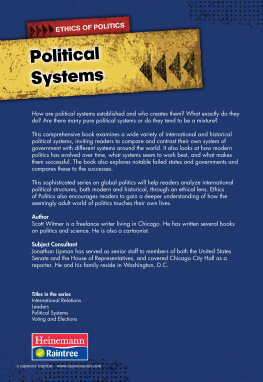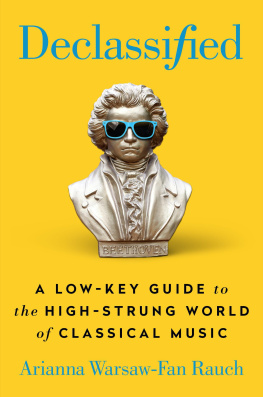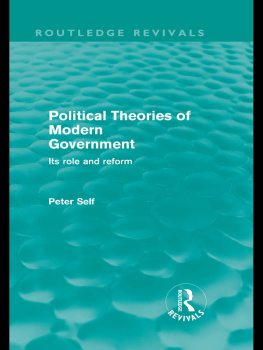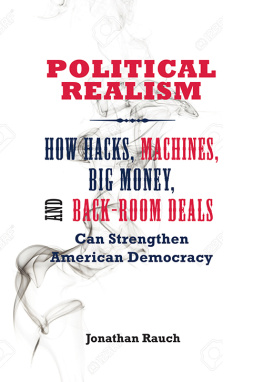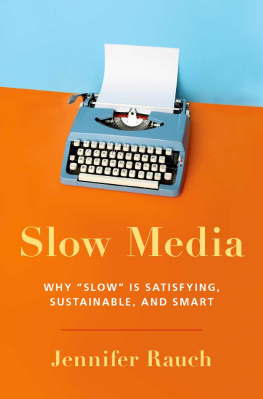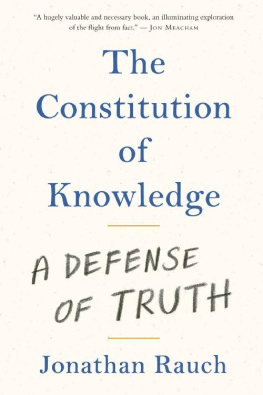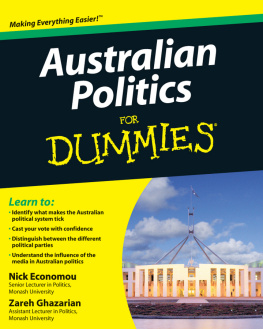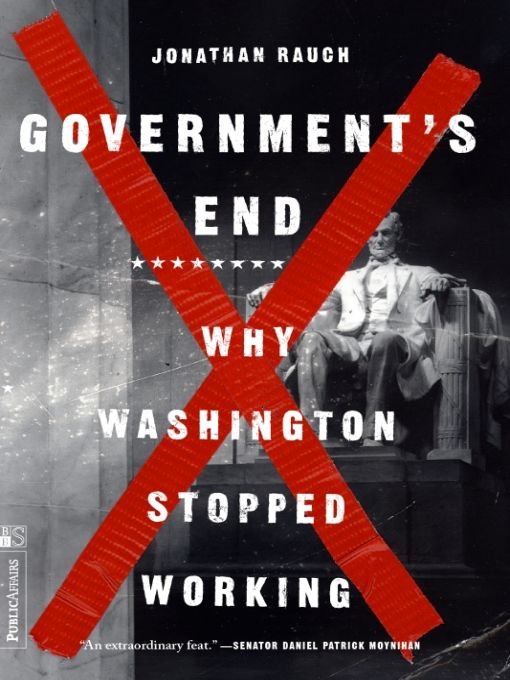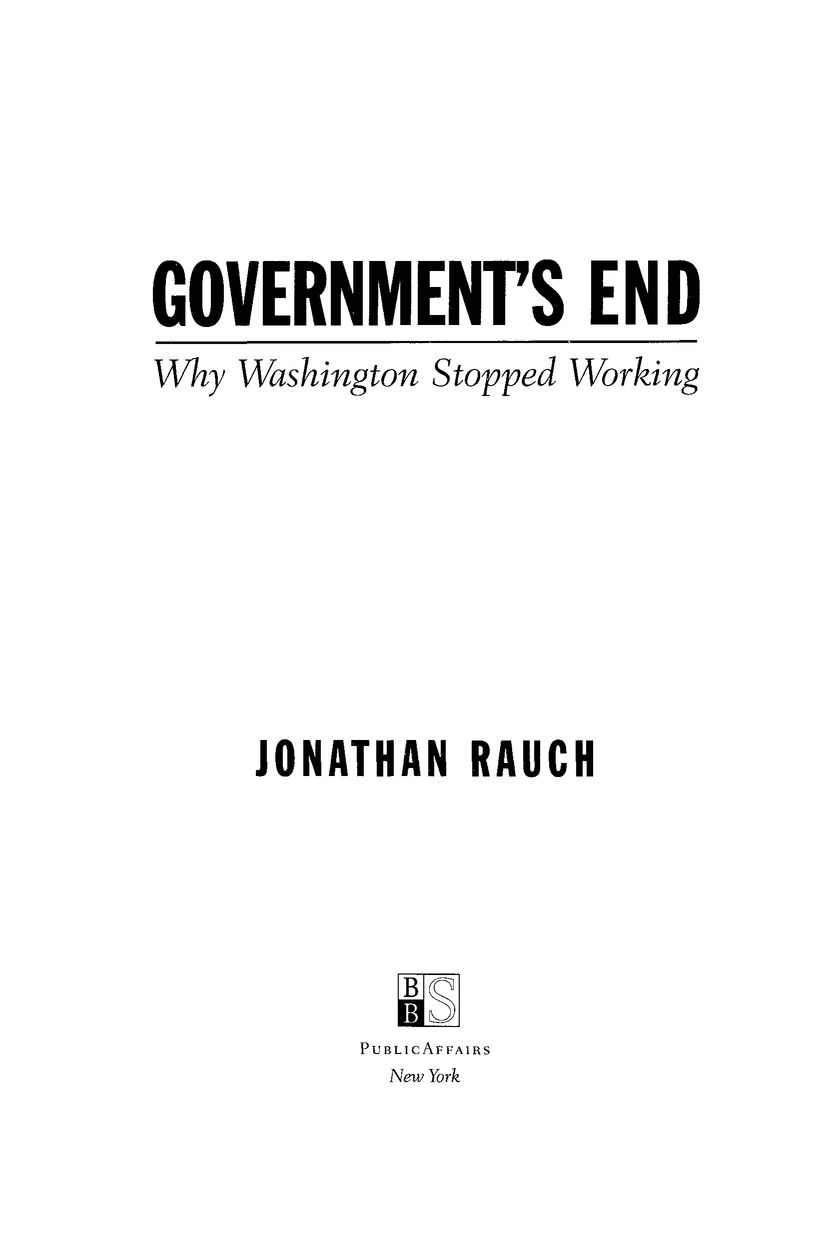Table of Contents
OTHER BOOKS BY JONATHAN RAUCH
Kindly Inquisitors: The New Attacks on Free Thought
The Outnation: A Search for the Soul of Japan
American Finance for the 21stCentury (with Robert E. Litan)
To the memory of Mancur Olson, teacher
The Trap
BETWEEN the time when the results became clear and the moment when the new president-elect emerged to acknowledge his victory, two long hours passed. A crowd of fifty thousand stood waiting for their man in front of the Old State House in Little Rock, Arkansas, shivering in bitterly cold weather that, being unseasonable, caught people in their shirtsleeves. Millions of citizens elsewhere waited, too. Younger people could barely remember a Democratic presidency and wondered how the first Democratic president-elect in sixteen years would sound. Their elders wondered whether the new man would show that he had learned from his Democratic predecessors mistakes.
At 11:22 P.M. central time, on November 3, 1992, Bill Clinton finally emerged, looking exhausted but happy. He had made history, and he knew it. His speech was short and began with thankyous for the crowd, the family, the voters, the running mate. Then came what was, in effect, the first substantive statement of the Clinton years. He announced that he would face problems too long ignored, and that people needed to be brought together so that our diversity can be a source of strength. Then he said: I think perhaps the most important thing that we understand here in the heartland of Arkansas is the need to reform the political system, to reduce the influence of special interests and give more influence back to the kind of people that are in this crowd tonight by the tens of thousands. And I will work... to do that.
Campaigning against special interestsrailing against them and deploring them and promising to break themis a venerable American tradition. In 1948, President Harry Truman cried out from his railway car that his campaign was a crusade of the people against the special interests, and the people cheered. In private, twenty years earlier, Calvin Coolidge warned his successor, Herbert Hoover, about the armies of interested parties who would be coming to see him. You have to stand, every day, three or four hours of visitors, Coolidge said. Nine-tenths of them want something they ought not to have. If you keep dead still, they will run down in three or four minutes. If you even cough or smile, they will start up all over again. Long before Coolidge, James Madison thought hard about how to contain the undue influence of what he called faction, by which he meant a number of citizens... who are united and actuated by some common impulse of passion, or of interest, adverse to the rights of other citizens, or to the permanent and aggregate interests of the community. If he had known the term special interest, no doubt he would have used it.
The curious thing is that ever since Coolidges day, and especially since Trumans, interest-group activity has increased. The more the public complained and the more the politicians promised change, the more the lobbies seemed to thrive and the more powerful they seemed to become. And so the president-elect stood there in 1992, promising to reduce the influence of special interests, as so many had promised before him.
Some years earlier, another young politician began a crusade against special interests. Like Bill Clinton, he set out to transform government into something more effective, more forwardlooking, more responsive. He was as determined as Bill Clinton, and also as bright (which was saying something). His name was David Stockman, and in those years, in the mid-1970s, he worked as executive director of the House Republican Conference, where his boss was a rather obscure moderate Republican named John Anderson. In 1975, out of the blue, Stockman announced himself to the world with a brilliant and provocative article that opened a new conservative front in the war against big government.
The vast increase in federal social welfare outlays, wrote Stockman in The Public Interest magazine, has created in its wake a political maintenance system based in no small part on the cooptation and incorporation of Congress itself. Conservatives and liberals alike channeled social spending, not to those who most needed it or to the places where it would do the most good, but to all 435 congressional districts, in a rain of political manna. The maxims of real-world social spending included Dont close the money sluice no matter how outmoded the program anda concise formulation of political utilitarianismThe greatest goodies for the greatest number. Urban-aid programs and housing programs and education programs had become for the 1970s what dams and bridges had been for the 1930s and 1940s. As a consequence, what may have been the bright promise of the Great Society has been transformed into a flabby hodge-podge, funded without policy consistency or rigor, that increasingly looks like a great social pork barrel.
Stockman soon went on to become a Republican congressman in his own right, and so fiercely did his intellect and ambition burn on Capitol Hill that the new Republican president, Ronald Reagan, chose him to be the administrations budget director after the 1980 election. From that post, Stockman became general of the campaign he had sketched in his article. He was the chief ideologue and strategist for what amounted to the first reformist conservative administration since the New Deal. As the Reagan administration began, he said: We have to show that we are willing to attack powerful clients with weak claims. I think thats critical to our successboth political and economic success.
What happened was not what Stockman had in mind. Within five years Stockman had retired from the Reagan administration and from politics, embittered and disappointed. In 1986, he wrote in the late months of that year in a postscript to his angry book The Triumph of Politics, the federal government again spent 24 percent of the GNP, compared to a pre-1980 norm of about 20 percent. Why? Because the White House has no semblance of a program or political will to spend any less. The powerful clients, he said, had won. After his book was published, little was heard from Stockman.
At about the same time, however, another reformer stood before a small group of conservative activists and explained to the frustrated audience how, despite Ronald Reagans failure, the fight against entrenched government could yet be won. I happened to be there that night and was fascinated by the peculiar but compelling visitor. Newt Gingrich talked grandly and abstractly and seemed as eccentric as his name. Yet his magnetism was apparent, and his unruly intelligence dazzling. The problem until then, he explained, had been failure to think outside the box. Whereupon he drew a box: a matrix of dots, three by three. He reminded his audience of the old puzzle: Connect all of these dots by drawing only four lines. The trick is that you cant solve the puzzle unless you draw lines that extend beyond the boundaries of the matrix. But if you break out of bounds, he said, you can solve it.
In 1995, he got his chance. When he became speaker of the House, Gingrich was determined to do from Capitol Hill what David Stockman had tried to do from the White House. The result, to Gingrichs credit, included two landmark reforms of recalcitrant and dysfunctional federal programs: farm subsidies and welfare. Elsewhere, however, Gingrichs failure was complete and comprehensive. Indeed, for his party it proved catastrophic. By 1999, Gingrich was a memory.


